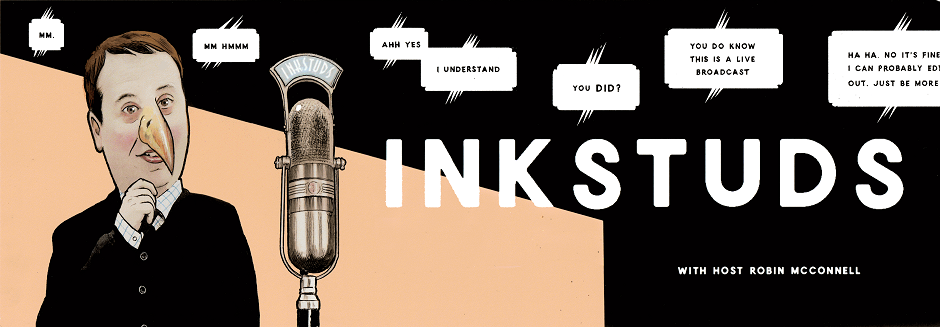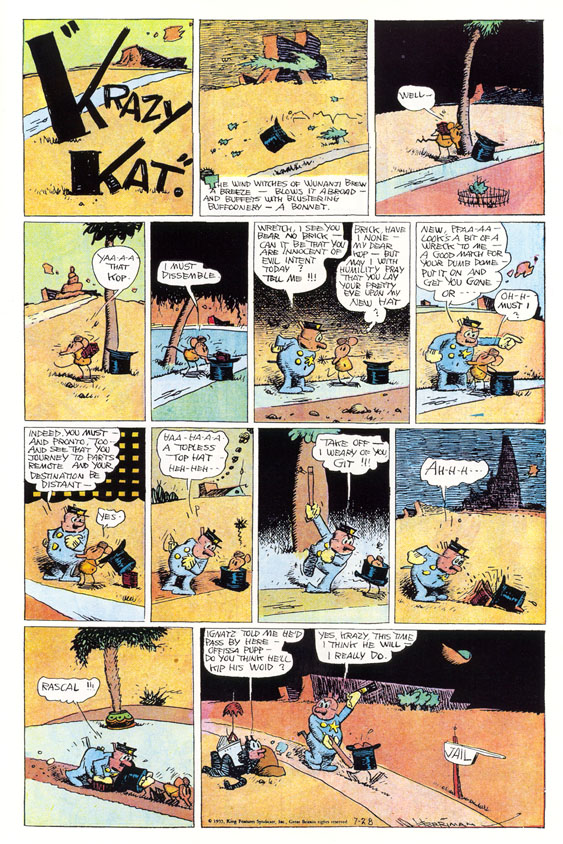After having such a blast doing my year end review show with some fantastic critics of comics, I decided I want to try and do these more often. This episode serves as a bit of a pilot project, to see how many titles, take how much time. We came up with a relatively small list of work to discuss and ended up talking for nearly 3 hours. I really enjoyed this talk, and will be doing this again in the spring, hopefully with a couple more critics joining in.
Thanks to Joe McCulloch, Matt Seneca and Tucker Stone for all bring their best comics talk game to the table.
Books discussed
Joost Swarte – Is That All There Is?
Milo Manara – Volumes 1 and 2 of new reprint library (Indian Summer, El Gaucho, and more)
Extreme Relaunch – Joe Keatinge and Ross Campbell‘s Glory and Brandon Graham and Simon Roy‘s Prophet
Ryan Cecil Smith – SF Supplementary File 2 a,b and c
And lastly – an odd discussion of 2000ad




This was great. Thanks.
Unexpected pleasant surprise. Also quite long for Inkstuds which is unexpected but also welcome.
yeah, about 3 times as long.
Holy shit, I listened to a two and a half hour podcast about comics. Thanks!
Awesome
Just been listening to this – really great episode, especially the Herriman discussion. One thing I wanted to mention: I think most British cartoonists would agree that Mick McMahon is our Kirby, just in terms of his influence on everyone who came after him – O’Neill, Bisley, Hewlett, even Bolland all acknowledge their debt to him. Just wanted to throw that in there – he’s pretty much the reason 2000AD looked the way it did during its classic era.
this was great! but me americano, me no understand french names. whose that other dude you guys talking about before Joost Swarte? challon? shallon? or somebody? can I get the name spelled?
Yves Chaland!
ahh Yves Chaland. thanks! I’ve seen those Freddy Lombard books before, but I never knew anything about Chaland before. they are great! I did read that murder by high tide book fanta put out this year. I assume M. Tillieux and Hergé are the guys he’s riffing on. I really like seeing this pulpy/ detective material presented straight faced but in a cartoony style.with the exception of Gould, it seems like in N.America that genera is chained to realistic drawing style.
But have you read the Cabby????
oh yeah, I love it. at the comics shop I work at we’ve got a decent selection of italian editions of comics not avaible in english. I’ve oft pointed out to folks the italian editions cabbie vol.1 and vol.2 & the Jose Munoz books as amazing comics I wish I could actually read. people seem to love it glad to see the cabby and corto maltese are back. Catalan was was ahead of their time, hope there is room in the future for some Munoz editions.
Hmmm… transcendant comics…
Kirby made them, did he? Hmmm…
Well, Watchmen is a British comic. (Moore, Gibbons, Higgins)
It might have been published in the USA, but Naked Lunch was first published in France, and it’s still, rightly, considered American, because the author is American.
I would have though that Watchmen could easily qualify as a transcendant work of British comics.
Also worth consideration is Bryan Talbot’s 1970 Luther Arkwright series, a very ambitious work with great reach and integrity.
Much of Kevin O’Neill’s run on Nemesis the Warlock is very special and definitely needs to be seen by anyone who wants to know the fuss is over 2000AD, but if I had to recommend only one artist’s run on that title, it would be John Hicklenton’s. Seriously. You need to see what he did with Pat Mills’ story. It’s ludicrously sick.
UK comics tend to be produced for a larger page than commonly used in the US, so try to find the Titan albums, which were the correct size, rather than the US market TPBs. Talbot, O’Neill and especially Hicklenton really need to be seen at (at least) 8″ x 11″ to be fully appreciated. Remember, 2000AD was nearly all black and white until the mid 90s, so the style is very different from US holding-line drawings, there’s a lot of fine textural and linear work which augments atmosheric and depth aspects which colour would otherwise be contributing to. Big pages required, small pages are not keeping it real.
Talbot, ONeill and Hicklenton.
Get to know.
More importantly though: Leo Baxendale.
Until you fully understand Leo Baxendale’s part in UK comics, what a giant of the medium he is, and can inhabit his fictional world and feel the forces at play there, you don’t know diddley.
I don’t consider Watchmen a British comic cuz it uses the American single-story pamphlet format and wouldn’t exist in anything like the same form if an American company hadn’t asked Alan Moore to think up a story based on characters created by American artists. If you want to classify it as a British comic feel free, but what I meant was that I haven’t encountered a certain type of work coming out of the British comics industry — and Watchmen is solidly a product of the American industry. Same with Flex Mentallo, which is the other book by British creators that came to my mind.
That’s an interesting way of thinking about artistic origins: solicitation and format – the commercial scene having more contextual relevance than the personal background of the artist.
I can see that more with film, where the primary artists are relying on a whole range of studio personnel connected to the territory they’re working in – likewise with theatre, record production, anything involving a lot of performers, technicians and assistants, as well as extensive equipment and architectural requirements – but with comics, novels, poetry, songwriting, the attribution of authorial responsibility seems much more weighted towards individuals.
I’m ignoring the issue of commercial viability, though, I’m not sure how relevant I consider that to the quality of a work. Depends on how relevent it is to the artist’s intent, I suppose.
Then again, maybe artists from small islands get more inspired when they know their work is going to be distributed across a whole massive continent, and that continent happens to be home to the World’s #1 market for spectacular enterprises.
Maybe Watchmen goes in a grey area (an interzone) nationality-wise, along with the Jimi Hendrix Experience.
Re: transcendent British comics
I agree that the field of truly remarkable work is shallower than, say, the US / France-Belgium / Japan. In large measure this is because throughout most of the twentieth century the comic strip was viewed in the UK as almost entirely a medium for juveniles. Within these parameters Leo Baxendale, Ken Reid, David Laws, and Dudley D. Watkins did marvellous humour work, much of it within the pages of ‘The Beano’ and ‘The Dandy’. In juvenile adventure strips Frank Hampson and Frank Bellamy did work that is comparable at the level of craft to Hal Foster or Alec Raymond.
The UK has also had world-class cartoonists working in the field of editorial / political / satirical cartooning, a tradition that through ‘Punch’ and Hogarth stretches into the nineteenth and eighteenth centuries. There has often been a strong strain of grotesquerie in this form of UK cartooning and Ralph Steadman, Gerald Scarfe, and Ronald Searle are all exceptional talents.
I’m assuming that by transcendent comics you’re meaning something like comics that have high artistic ambitions which are successfully executed. ‘Watchmen’ notwithstanding ‘V for Vendetta’ and large parts of ‘Miracleman’ were definitely published within a Brit comics context. Some other high-level work in my view is Eddie Campbell, ‘Alec’; Pat Mills & Joe Colquhoun, ‘Charley’s War’; Raymond Briggs, ‘Where the Wind Blows’ and ‘Ethel and Ernest’. The list is not nearly so long as I would like – the UK still seems to largely lack a groundswell of ambitious art-comix makers although imprints like Nobrow and Landfill make me hopeful.
OOPS: “Bryan Talbot’s 1970 Luther Arkwright series” should be 1970s, not 1970.
We need more of Breccia’s work translated, Mort Cinder would be good, but especially the period that started in the late 60s.
His run on Oesterheld’s El Eternauta, for instance.
Actually, is Solano Lopez’s Eternauta even available in English? It certainly should be.
The 2000AD talk was really cool, but was lacking in proper Mick McMahon love. That dude is amazing.
In terms of other cartoonists who can write nearly as well as Herriman (and I agree with the basic fact that he’s the best writer we’ve ever had in comics) I would mention Ben Katchor, Lynda Barry, Chris Ware and, this will surprise people but it’s true, Robert Crumb. Maybe I have a blind spot when it comes to Alan Moore but, with all allowances to his evident intelligence and craft skills, he doesn’t seem to belong in the same league as Herriman, Katchor, Barry and Ware.
The problem with comparing Herriman to modern cartoonists, is that they aren’t even using the same comic vernacular. I think there is a synthesis in Herriman’s work that is incomparable to Ware and like.
I also have a particular soft for Moore, and I am concerned that because of the predominance of his work being in genre, that is most likely a barrier to your enjoyment. I personally think the construction of Watchmen is on par with Jimmy Corrigan and David Boring, but done through the lens of 1980’s nihilistic superhero.
I don’t know if it’s the genre aspect that bothers me about Moore’s work — I rate Jack Kirby’s work very high and he worked within mass-market genres (and also created a few mass market genres of his own). In fact, I think Kirby offers a clue as to what bothers me about Moore’s work. In all his comics Kirby created an open universe that could be imaginatively inhabited and colonized. Moore’s genre work, by contrast, seems not just closed by airtight and even suffocating. There’s no denying the intelligence and craft that Moore, Gibbons and company put into Watchmen but — despite repeated readings to figure out what the fuss is about — I find it hard to engage with it emotionally. The tiny traumas of Jimmy Corrigan and the emotional turmoil of David Boring are effecting in a way that the death of millions in Watchmen isn’t.
The death of millions is no where near the focus of the book to me. It is more about exploring the distinct characters and unpacking them as people. But the work isn’t about the tiny trauma’s of Ware and Clowes, I am speaking more to the narrative depth and complexity. There are different ways of reading a work like The Watchmen, and unfortunately, the 5 million copy cats have been a disservice to this work.
The two serials Moore wrote for 2000AD, Skizz (with Jim Baikie) and The Ballad of Halo Jones (with Ian Gibson), are more interesting than any of his superhero work, to me, as they reflect on everyday life via genre fiction, rather than making a subject of the genre itself. Skizz is somewhat akin to Martian Poetry, and Halo Jones is a sort of SF Bildungsroman, suffused with melancholy.
Unrelated to the comix, what was that fantastic song at the start of the podcast?
Never mind, https://youtu.be/USWLHcRIdBU
I thought it was too upbeat to be Leonard Cohen but I guess Phil Spector was involved.